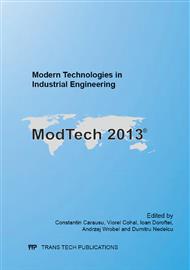p.577
p.582
p.588
p.594
p.603
p.607
p.612
p.618
p.624
Business Ecosystems: Strategy Maps in Relation to Sustainable Development
Abstract:
Continuous economic and social changes led to the development of new concepts both in business as well as in academic environments. As a result, one of them is the concept of business ecosystem. This concept brought a new definition of an industry through clear delimitation of organizational roles and relationships which are evolving around a common strategy and through the vision of an industry as a community of interrelated organizations who work together for a common benefit. This paper aims to provide a conceptual framework for a business ecosystem with a view to measure its performance by means of strategy maps. The main purpose of strategy maps is to communicate the strategy throughout the organization and to ensure its proper and successful execution. From this point of view the findings should reveal how the organizations inside business ecosystems are adapting a common strategy and the importance of the value creation processes established inside the business ecosystem. In order to achieve this objective it will be identified the business ecosystems strategy along with specific features and it will be transposed in a Balanced Scorecard framework according to its four perspectives: financial, customer, internal processes and learning and growth. Each perspective respond to organization needs and reflects the most important strategic objectives. The linkage and relations between each perspectives elements will be established by analyzing sustainable development influences as a new trend of organization development and as response to global concern to environment, social and economic evolution. This direction of analysis will provide, for various stakeholders, a new framework to implement the concepts of eco-innovation and eco-development as well as cooperation and co-evolution. Basically these concepts will be considered as key aspects of analysis as well as for the strategy implementation process and will provide knowledge about organizations mechanisms related to its role as a business ecosystem within the context of the internal and external environment. The main outcome, the foreseen result, is to create a strategy map template for a business ecosystem that could foster the importance of cooperation and co-evolution concepts for strategy implementation.
Info:
Periodical:
Pages:
603-606
DOI:
Citation:
Online since:
November 2013
Authors:
Price:
Сopyright:
© 2014 Trans Tech Publications Ltd. All Rights Reserved
Share:
Citation:


